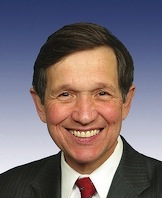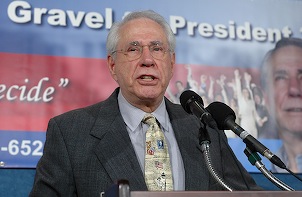Wow, what took so long? Just 18.5 months before election day, it's the "First in the Nation" presidential candidate debate
04/26/07 09:11 PM


By ED BARK
Eight Democratic candidates and one publicity-hungry cable news network added up to the "First in the Nation" presidential debate early Thursday evening.
The carrier, MSNBC, spent virtually the entire day flogging it, even providing a Countdown Clock for those viewers who otherwise have absolutely no lives. Then they analyzed it ad nauseum far into the night after invading the campus of South Carolina State University with Chris Matthews, Keith Olbermann, Joe Scarborough, Tucker Carlson, Andrea Mitchell and debate moderator Brian Williams among many. Apparently Triumph the Insult Comic Dog couldn't make it.
Even Matthews had a little trouble rousing himself in the early aftermath of the 90-minute close encounter among Barack Obama, Hillary Clinton, John Edwards, Joe Biden, Chris Dodd, Bill Richardson, Dennis Kucinich and Mike Gravel.
"It was very civilized, and therefore not that exciting," Matthews said. So much so that "this could have been on public television."
But we wouldn't want to have that. MSNBC sorely wants to establish itself as the go-to network for presidential politics, but even a hapless, hopeless junkie couldn't possibly have eaten the whole thing Thursday. All of this pomp and circumstance for a Decision 2008 thumbsucker held 18-and-a-half months before election day.
There were no rules of order on candidate exposure, which meant that fiery, elderly former Alaska senator Mike Gravel mostly got left out of the picture.
"I was beginning to feel like a potted plant standing over here," he said at one point.
Gravel and Ohio congressman Dennis Kucinich both had nothing to lose because they have no chance to win. So they spoke with bold conviction, making their six higher-powered rivals seem like milquetoasts on the war in Iraq. Both of the field's extreme longshots just simply want to get out -- immediately.
Kucinich said, "This isn't American Idol here. We're choosing a president and we have to look at the audition that occurred in 2003," when most of his rivals voted for the war in Iraq.
He later held up a pocket copy of the Constitution to buttress his call for the impeachment of Vice President Dick Cheney, whom he essentially brands a war criminal.
Gravel for his part professed to be "frightened" by some of the high-powered Democrats onstage. Asked to be more specific, he pointed at the "frontrunners" (Clinton and Obama). When Biden also raised his hand, Gravel dismissively included him, too, calling the longtime Delaware senator "arrogant" for thinking he knows what the Iraqi people want.
"They were the flamethrowers tonight," Matthews said of Kucinich and Gravel.
Not that any of this matters. Today's presidential politics have nothing to do with survival of the fittest. It's strictly a game for the richest war chests, and neither Kucinich or Gravel have enough dubloons to buy a Long John Silver franchise.
Kucinich, still kind of goofy looking, does have a stunning new red-haired wife, Elizabeth, whom he first met in 2005. That ought to be worth a little something in American politics, and Kucinich seemed to know as much. The two held hands on-camera throughout his post-debate interview.
Gravel had a good time, too, telling Matthews after the debate that his rivals will continue to dance around important issues "as long as you in the media keep building them up."
Matthews wanted to know where Gravel had been since he left the Senate in 1981.
"Hiding under a rock," he rejoined, triggering a patented Matthews donkey hee-haw. But seriously, "I felt terrible about the (political) system," Gravel said.
Olbermann then cracked, "Zell Miller had just endorsed Mike Gravel's candidacy," a reference to Matthews' big dustup with Georgia senator Zell Miller, who challenged him to a duel at the 2004 Republican convention.
All of this came very early in the night. By midnight (central time), four-and-a-half hours after the debate had ended, MSNBC's Scarborough and an "all-star panel" were still picking over the debate.
And they'd probably only just begun.
